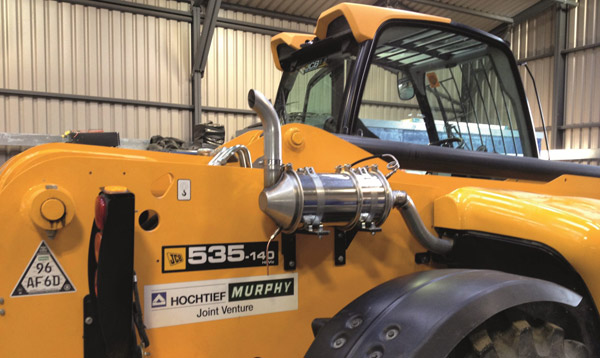
An innovative filter system that can be fitted to site plant and machinery is helping leading construction firm, J. Murphy & Sons Limited (Murphy) reduce particle emissions by up to 99 per cent on its diesel powered-plant.
The Diesel Particulate Filter System (DPF) is among innovative initiatives instigated by the company to ensure cleaner, energy efficient working across its sites.
Developed by Baumot, specialists in diesel engine overhauls, the DPF is designed to remove soot from the exhaust gas of a diesel engine to ensure a significantly healthier and less polluted environment.
Compliant with Euro IIIB standards to control dust and emissions during construction and demolition which require non-road mobile machinery in central London, the filter system captures soot by passing exhaust gases through a series of filters. Over time, the soot builds up within the filters and is reduced to ash residue through the heat of the exhaust in a process known as regeneration.
In 2015 the Mayor of London published supplementary planning guidance (SPG) on the control of dust and emissions during construction and demolition which requires non-road mobile machinery in central London comply with Euro IIIB.
As well as eliminating particle emissions, the filter means machinery previously non-compliant with emissions regulations can be brought into use.
Stephen Marr, environmental manager at Murphy, said: “Using the DPF system has made a significant contribution to reducing our air emissions. This helped us achieve full compliance with strict air quality standards and minimising the impact on our employees and local communities.”
Murphy also used the system recently to safeguard the wellbeing of the onsite team during the recent construction of the new railway tunnel at Farnworth.
Diesel engine exhaust emissions (DEEE) are recognised as a category 1 human carcinogen (“definite”) by the International Agency for Research in Cancer (IARC) for lung cancer. Recent HSE cancer burden research estimates that there are almost 650 deaths per year from all workplace exposures to DEEE in the United Kingdom.
Among proactive measures taken to reduce exposure to DEEE, Murphy removed red diesel from all plant operating in the tunnel, replacing it with premium diesel fuel. The company also planned and constructed a 350mm twin wall pipe within the crown of the tunnel prior to filling it with foam concrete. This allowed air to be extracted from the opposite end of the tunnel as air was forced in from the open face, providing a positive flow of air within the tunnel.
In terms of energy efficiency, Murphy has achieved a significant increase in recent years. In 2009 the company set a target to achieve a 10 per cent reduction in carbon emissions across its UK business by the end of 2014 but actually achieved a 22 per cent reduction following a variety of initiatives, many of which focused on fuel and electricity emissions. These included fitting 1,900 commercial vehicles with trackers to monitor driver performance and capping vehicles at 70mph, investing in electric and hybrid vehicles, and running driver awareness campaigns to encourage energy-efficient driving.